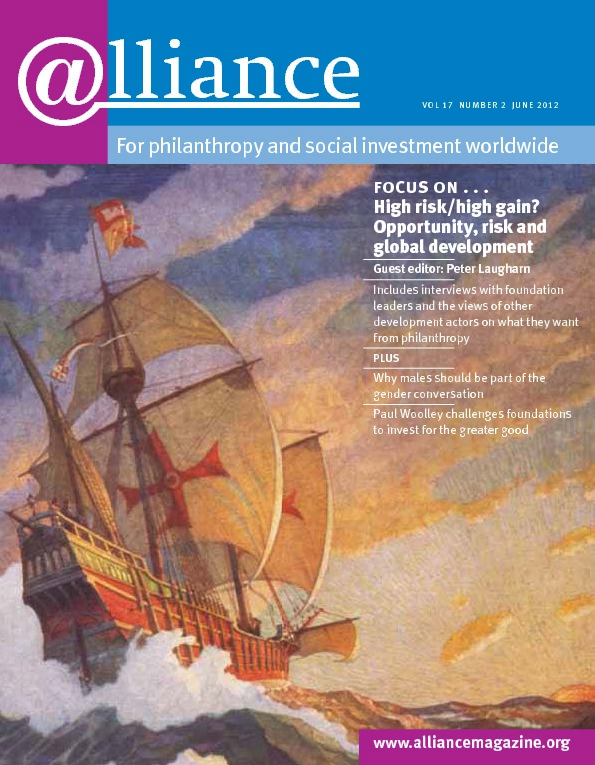A session on ‘Risky Business’ at the European Foundation Centre (EFC) conference this month will explore the relationship between risk and creativity. In preparation for the session, Selim Iltus and Barry Knight surveyed EFC member foundations. Results suggest a paradox: while foundations say they embrace risk, their practice suggests they don’t.
 Almost all (94 per cent) of the 48 foundations that responded fully either ‘completely agreed’ or ‘agreed’ with the statement that ‘foundations have a responsibility to take risks in their programming decisions’. However, the proportion that ‘completely agreed’ or ‘agreed’ that they would ‘take risks that could result in negative public relations’ was 31 per cent. The equivalent proportion that would ‘take risks that could result in damaging its relations with government’ was 30 per cent, and the proportion willing to ‘take risks that could result in loss of capital due to programme investments’ was just 19 per cent.
Almost all (94 per cent) of the 48 foundations that responded fully either ‘completely agreed’ or ‘agreed’ with the statement that ‘foundations have a responsibility to take risks in their programming decisions’. However, the proportion that ‘completely agreed’ or ‘agreed’ that they would ‘take risks that could result in negative public relations’ was 31 per cent. The equivalent proportion that would ‘take risks that could result in damaging its relations with government’ was 30 per cent, and the proportion willing to ‘take risks that could result in loss of capital due to programme investments’ was just 19 per cent.
What drives risk?
On a combined scale that took account of different aspects of risky behaviour, small foundations were significantly more likely than larger ones ‘to engage in original projects and approaches’, ‘work with new partners without an established reputation’, and to have ‘encountered risks in the past that had extreme (good, bad, or otherwise) consequences’.
Social justice is also a driver of risky behaviour. Using a combined scale of six interrelated items measuring social justice (whether, for example, issues like poverty reduction and human rights are high priorities for the foundation), we found that, having controlled for size, foundations pursuing social justice were more likely than others to take risks with their reputation, their relations with the government and their donors.
The survey suggests that large, mainstream foundations are most risk-averse. It is also clear from the survey that risk-taking is strongly correlated with developing innovative projects. There is no escaping the fact that risk and creativity are intimately connected.
Delving deeper
We used the survey to delve deeper into risk, examining both foundations’ general attitude to risk-taking and their actual practice, specific to their foundation alone. We found five main types of attitude: the ‘responsible risk taker’ who is concerned with innovation; the ‘non-believer’ who says that risk is unnecessary and not worth taking; the ‘scientific calculator’ who believes that risks can be taken after careful calculation; the ‘pessimist’ who says you can’t avoid risk and have to bear the consequences; and the ‘ever alert’ who is always covering their back.
On practice, we found six main types: ‘careful and cautious towards risk’; ‘kamikazes’ who jump in regardless of consequences; ‘creative adventurists’ who ignore risk; ‘experienced, confident old timers’; ‘conservatives run by iron-fisted boards’; and those who ‘transfer all decisions and consequences to top management’. The correlation between attitude and practice was weak, strengthening further the finding that that there is a gap between what foundations believe and what they do.
A confused field
Again, there was a lack of decisiveness in answering questions about risk. We typically used five-point scales in our survey, ranging from ‘completely agree’ through to ‘completely disagree’. We found disproportionately high use of the mid point on the scale, suggesting that on many questions people were unsure or had no opinion.
The survey has confirmed what we suspected before we started, namely that the field of philanthropy is confused about risk. Not only do people have no clear opinion on many vital aspects of risk, but there is cognitive dissonance: people say that risk is part and parcel of their work, but their behaviour suggests otherwise.
Moving forward
Unless the field faces up to these questions, its identity and purpose will remain unclear. The session at the EFC conference in Belfast offers a rare opportunity to address them. It will enable people to explore the concept of risk and to decide if they want to become more creative while finding ways to manage risk. There will also be an opportunity for people to decide whether there is a role for EFC members to work together to find better ways to manage the relationship between creativity and risk. A pre-conference session on the topic of this Alliance special feature will also focus specifically on ‘high risk/high gain’ activities.
Selim Iltus is research and evaluation officer for the Bernard van Leer Foundation. Email Selim.Iltus@bvleerf.nl
Barry Knight is the co-chair of the Working Group on Philanthropy for Social Justice and Peace. Email barryknight@cranehouse.eu


Comments (1)